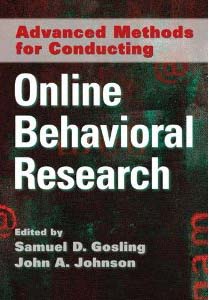Advanced Methods for Conducting Online Behavioral Research

Book chapters take form of self-contained tutorial
“Advanced Methods for Conducting
Online Behavioral Research”
Edited by Samuel D. Gosling and John A. Johnson
American Psychological Association
Washington, D.C., 2010
By James K. Luiselli, Ed.D., ABPP, BCBA-D
The Internet has become an invaluable resource for conducting research. As the editors of this book propose, Internet-based research can ease the process of data collection, capture large populations, allow for instantaneous storage of results and permit rapid feedback to participants. At the same time, doing research via the Internet poses some practical and ethical concerns. “Advanced Methods for Conducting Online Behavioral Research” reflects this rapidly evolving area of specialization.
Psychologists Samuel D. Gosling and John A. Johnson state, “Our goal is to provide you with a practical step-by-step guide, something that can sit by you on the desk as you develop and implement your study.” Indeed, each of the 16 chapters in the book is relatively short and by design, takes the form of a self-contained tutorial. However, the editors advise that their book will appeal most to readers who have basic knowledge of Web-page construction, specifically familiarity with hypertext markup language (HTML), Common Gateway Interface (CGI) scripts and methods for uploading Web pages.
One of the best chapters in the book is titled, “An Overview of Major Techniques of Web-Based Research.” Essentially the chapter is an “everything you need to know” overview condensed into 15 pages. I found that by reading this chapter several times, I was better able to grasp concepts and methods that were presented in subsequent chapters.
Another informative chapter is “Collecting Data from Social Networking Web Pages and Blogs.” These two types of social media offer researchers a wide audience for distributing surveys online, source material for completing qualitative and quantitative data analysis, and access to information that typically is not available with traditional research methodology. The drawbacks with social media research, namely credibility and disguised motives of participants, are dutifully discussed in the chapter.
Although the technical writing in the book at times is challenging, the pragmatic focus in many of the chapters can be followed profitably. For example, there are guidelines for constructing Web-based self-report inventories, implementing incentives to increase participant responses and securing, storing, and protecting collected data. The book concludes admirably with a chapter on “Ethical Issues in Psychological Research on the Internet.”
If you are interested in and conduct research, then you should read this book. I certainly was impressed and humbled by how impressively research options have expanded since my days as a graduate student and early-career professional! Accordingly, the book should find a home in university research methods courses within a behavioral sciences curriculum. There is much to be learned about the merits and pitfalls of online behavioral research and this book is a good place to start.
James K. Luiselli, Ed.D., ABPP, BCBA, is senior vice president, applied research, clinical training and peer review at the May Institute in Norwood, Mass.
Learn more about the book: Advanced Methods for Conducting Online Behavioral Research
